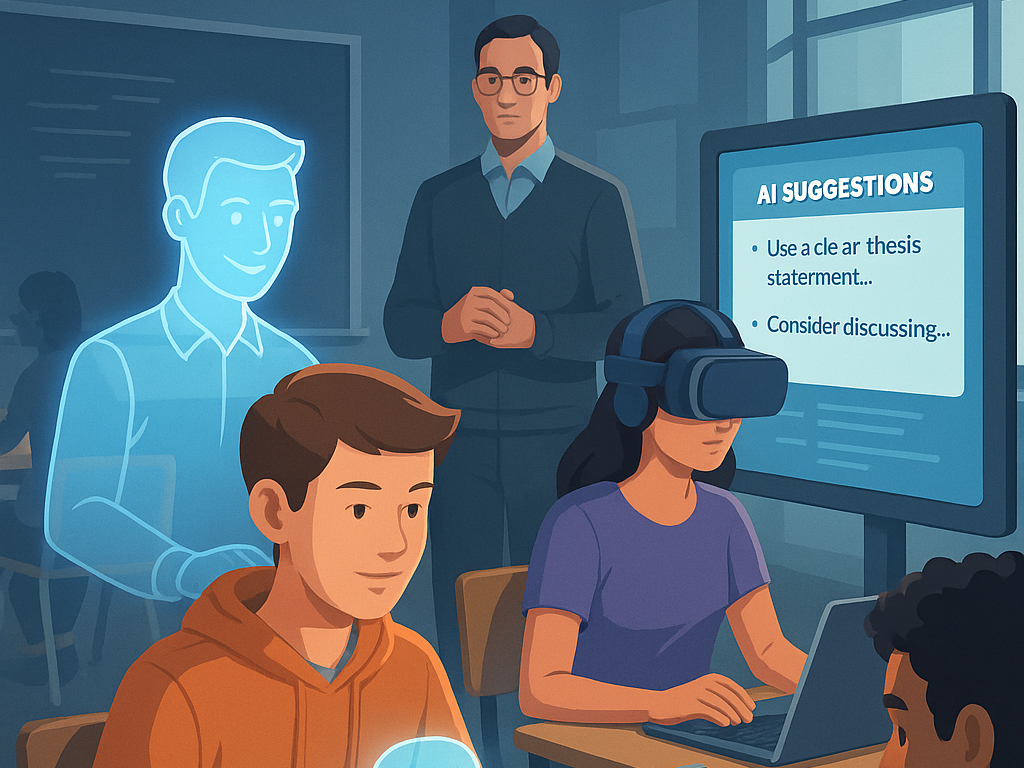Are AI tools for students making them better learners? The integration of artificial intelligence (AI) in education is expanding rapidly, promising personalized learning, increased accessibility, and support for inclusion. Intelligent Tutoring Systems (ITS) like Carnegie Learning and Khanmigo adapt content in real time based on student profiles, helping struggling learners catch up and offering enriched challenges to the gifted [1]. Simulations using VR or AR, such as Brain Power for students with autism or iGYM for inclusive physical activity, demonstrate how AI can foster skill development in diverse learners. These tools exemplify how the best AI systems aim to “meet students where they are” and expand adaptivity in education [2].

Critical aspects
However, while these technologies hold potential, evidence about their actual educational impact remains mixed. Much of current AI in education still automates outdated practices, like rote memorization and high-stakes testing, rather than transforming pedagogy to develop critical thinking, collaboration, or creativity [3]. For instance, student protests against Summit Learning—an ITS funded by the Chan Zuckerberg Initiative—highlight discomfort with excessive screen time and lack of human interaction, raising questions about learner agency and engagement.
A more promising direction may lie in continuous AI-enabled assessment. Rather than relying solely on exams, AI could track student progress over time and generate personalized feedback [3]. This could culminate in dynamic AI-driven e-portfolios, integrating formal and informal learning experiences, verified through blockchain, and accessible to educators or employers. However, the implementation of such systems introduces ethical concerns, especially around surveillance, data privacy, and control over learners’ educational narratives [1].
Furthermore, AI systems often reinforce the biases embedded in their data and design, perpetuating narrow, instructionist models of education while sidelining contextual and social learning [3]. Equity is another critical concern: without robust infrastructure, training, and oversight, AI risks deepening digital divides and creating new forms of techno-ableism [1].
GenAI in academia
While AI holds transformative potential for learning, it must be deployed critically. Recent research into the use of generative AI (GenAI) in academia reveals diverse and sometimes conflicting attitudes toward its integration into the research process [4]. A large-scale study of over 2,500 Danish researchers found that GenAI is most positively viewed for tasks such as language editing and data analysis—seen as useful supports rather than ethical threats. However, its use in experimental design, peer review, or synthetic data generation raised more concern, with researchers warning against uncritical adoption and calling for context-aware, field-specific guidelines. Similarly, in education, AI should not replace but rather augment the human dimensions of learning—supporting, not supplanting, the development of thoughtful, autonomous, and empowered learners.
Conclusion
Ultimately, the best AI in education will not be those that automate the most, but those that empower the most.
Discover more watching the following documentary
References
[1] Varsik, S. and L. Vosberg (2024), “The potential impact of Artificial Intelligence on equity and inclusion in education”, OECD Artificial Intelligence Papers, No. 23, OECD Publishing, Paris, https://doi.org/10.1787/15df715b-en
[2] U.S. Department of Education, Office of Educational Technology (2023), Artificial Intelligence and Future of Teaching and Learning: Insights and Recommendations, Washington, DC. https://www.ed.gov/sites/ed/files/documents/ai-report/ai-report.pdf
[3] UNESCO, Miao, F., Holmes, W., Huang, R., & Zhang, H. (2021), AI and education: Guidance for policy-makers. UNESCO. https://doi.org/10.54675/PCSP7350
[4] Andersen, J. P., Degn, L., Fishberg, R., Graversen, E. K., Horbach, S. P. J. M., Kalpazidou Schmidt, E., Schneider, J. W., & Sørensen, M. P. (2025), Generative Artificial Intelligence (GenAI) in the research process – A survey of researchers’ practices and perceptions. Technology in Society, 81, 102813. https://doi.org/10.1016/j.techsoc.2025.102813
Acknowledgement
A version of this article was originally written for “The Ind(i)ependent Researcher” Newsletter on Substack. The author retains full copyright and intellectual ownership of the content.
